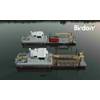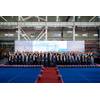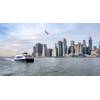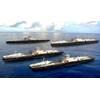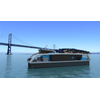Stena Line is 10 Years Ahead of IMO Emissions Goals

Stena Lines' new vessel Stena Estrid on the Irish Sea: The E-Flexer vessels represent the next generation RoPax vessels in terms of energy efficiency and can lower CO2 emissions by about 25% compared previous generations of ships. (Photo: Stena Line)
Ferry shipping company Stena Line reports it is 10 years ahead of international shipping's emissions reduction targets thanks to measures such as new, larger and more energy efficient vessels, AI assisted captains and an increased punctuality.
The Sweden-based operator says that during 2019 it reduced its total CO2 emissions 1.7 %, corresponding to 24,000 metric tons of CO2 in total, while CO2 emissions per transported ton freight and passenger vehicles on board the vessels fell 3.6%.
The company notes in its newly published sustainability overview report that it already meets the International Maritime Organization (IMO) targets for 2030 of a 40% reductions in CO2 emissions efficiency from 2008-2030.
“During the last 10 years we have improved the efficiency with more than 320 energy efficiency actions onboard and onshore, both technical and operational improvements and investments,” says Erik Lewenhaupt, Head of Sustainability at Stena Line. “The introduction of AI assisted vessels and the delivery of our first new larger and energy efficient vessels that went into operations on the Irish Sea during the spring, are some highlights from last year.”
“We aim to be the leader in sustainable shipping and we have high ambitions,” Lewenhaupt says.
“Our commitment to sustainability centers around five focus areas that support the United Nations’ Global Goals. Together we work to protect life below water, ensure responsible consumption, increase the use of clean energy and ensure safety, good health and well-being for our guests and employees. We embrace equality and inclusion in all aspects of our business. Ambitious targets are defined for each area, and the development is closely monitored, with the ambition that Stena Line should be a leader in sustainable shipping,” the company says.
Other notable initiatives include the reduction of almost all single use plastic on board and improved share of recycled material in its offices, ports and terminals. The company has also reduced the use of harmful chemicals and detergents; its newly introduced vessels Stena Estrid and Stena Edda feature 80% Eco-label chemicals. Stena Line reports it has increased the number of female leaders in the company, now with 20% of managers being females.
Looking ahead, Stena Line says it will continue to further its sustainability initiative despite the current difficult market conditions confronting the ferry industry amid the COVID-19 pandemic.
But the largest challenge for the shipping industry as a whole and for Stena Line is to reach zero emissions by 2050, in line with international targets, the company says.
“We are currently working in parallel with reducing fuel consumption, and emissions to sea and air and at the same time exploring and evaluating the fuels for the future. We are currently involved in several projects with alternative fuels and propulsion, including the world’s first methanol powered vessel and a battery project with the aim of launching a fully battery powered vessel before 2030,” Lewenhaupt says.



